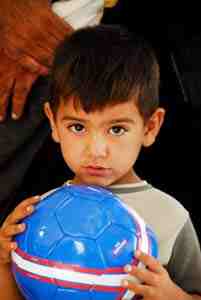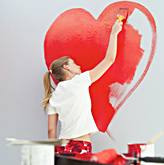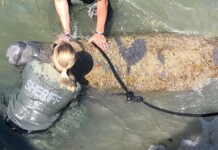 The Nations of the world can gather this week with pride on the occasion of the 63rd session of the General Assembly of the UN in New York City, having together achieved great progress this summer in bringing peace, stability, fun, and health to millions of the least fortunate people around the world.
The Nations of the world can gather this week with pride on the occasion of the 63rd session of the General Assembly of the UN in New York City, having together achieved great progress this summer in bringing peace, stability, fun, and health to millions of the least fortunate people around the world.
Take a look at this impressive handful of beneficial programs launched and conducted this year by the UN to help women create jobs, aid hurricane victims, fight malaria, preserve ancient Egyptian history, broker peace deals and spread laughter, as well as school lessons), to child refugees (thanks to Clowns Without Borders).
• 150,000 people displaced in the country of Georgia, many of them children, are benefitting from a United Nations Children’s Fund project organized to help the Georgian kids start the new school year. The UNICEF project addresses the challenges of helping children from the recent conflict with educational, sports and recreational activities.
• UNICEF also announced on September 4th it will spend an additional $1.7 million to provide insecticide treated beds to Ghana to prevent the spread of malaria in the west African country. Malaria is the number one killer of children under five years old there making this effort so important.
• UNESCO (the UN Organisation for Education, Science, Culture and Communications) will help Egypt to preserve submerged historical artifacts thousands of years old by creating a museum that is partially underwater in the Bay of Alexandria. Within this first of its kind museum, visitors will be able to see ancient artifacts in the sea bed while the artifacts are protected from looters.
• On September 7th the UN Security Council celebrated the signing of a pact between the warring political factions in Somalia and brokered by the UN. For the people of this war torn country this pact, called the Djibouti Agreement, represents the end of armed conflict and grants free access to humanitarian groups that provide aid and supplies to the citizens.
 • On the other side of the world in Cambodia famous fashion designer Bibi Russell joined forces to produce a line of contemporary hand bags to feature the handiwork of Cambodian women with HIV. The bags will be fashioned with Cambodian silk and other local materials and sold under the label “Bibi for We”. Thanks also to the UN Development Program, profits from the bag sales will support the Cambodian women and help them lead a productive life with dignity.
• On the other side of the world in Cambodia famous fashion designer Bibi Russell joined forces to produce a line of contemporary hand bags to feature the handiwork of Cambodian women with HIV. The bags will be fashioned with Cambodian silk and other local materials and sold under the label “Bibi for We”. Thanks also to the UN Development Program, profits from the bag sales will support the Cambodian women and help them lead a productive life with dignity.
• An online eco-atlas to help “arm chair environmentalists” understand the impact people can have on saving the environment, has been developed by the United Nations Environment Protection Agency. It includes rich geographic images from the far corners of the globe in order to stimulate both better stewardship and interest towards saving at risk areas.
• In Syria, the UN is working with the Syrian Red Crescent providing displaced Iraqi school children with school supplies and their parents with information on the educational options available to them while estranged from their home country. In another project hundreds of displaced Iraqi women living in Syria are learning the healing power of laughter with workshops developed by the UN and the organization called Clowns Without Borders. Using theater, humor and communications, the women are finding this both relaxing and rejuvenating. There are also workshops offered for refugee children to help them address the recent traumas and separations in their young lives.
• UN agencies including the World Food Program were on the ground in the Caribbean following recent hurricanes. The aid troops helped evacuate people from unsafe areas, distribute supplies and take injured people to working hospitals for medical assistance.
• Last, but certainly not least, the International Olympic Committee and the UN High Commissioner for Refugees collected 30,000 donated items of clothing from athletes at the recent Beijing games. This was part of a larger Giving is Winning program which has collected over 80,000 articles of clothing to date. At the games each athlete’s room contained biodegradable bags to collect clothing from the athletes and the competitive teams both small and large responded to the initiative in a big way. The items collected at the games will be given to refugees in Asia, although earlier donations went to parts of Africa, Panama and the country of Georgia. Beyond simply receiving a garment it is hoped the recipients recognize that the famous athletes care about them.
Stay tuned to GNN-i for more ongoing news of the positive work being done by the members and agencies of the United Nations.



















